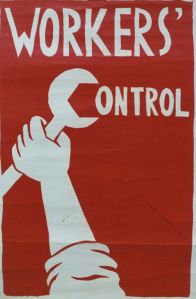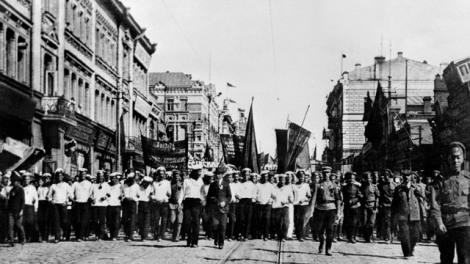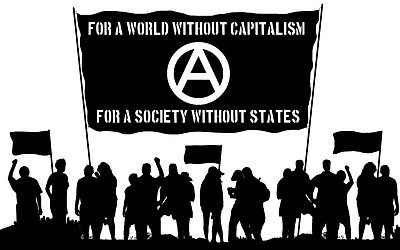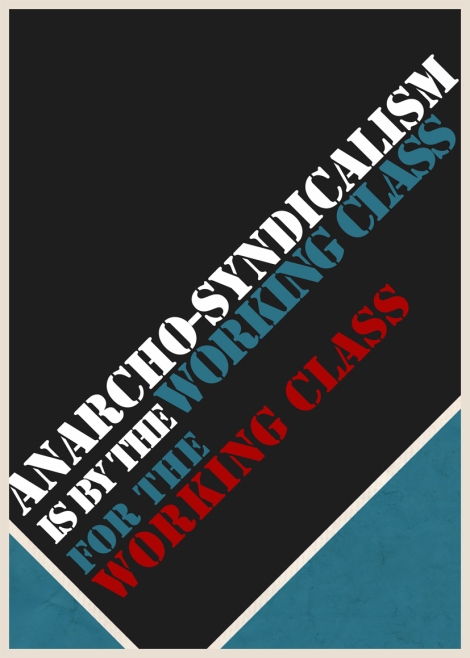Russian anarcho-syndicalists regarded the February 1917 Russian Revolution as the beginning of the social revolution they had long worked for, pointing to the soviets, factory committees, peasant seizures of land and other examples of the self-activity and self-organization of the masses which they hoped would replace the Russian state machine and capitalist economic relations. In the following declaration from June 1917, when the Provisional Government was still embroiled in the First World War, the Petrograd Union of Anarcho-Syndicalists set forth their approach to revolution, with their ultimate goal being anarchist communism. They note the ongoing failure of the political authorities to deal with the economic collapse brought on by the war, and the need for the Russian people to resolve the crisis through their own direct action, a position similar to that taken today by anarchists in Greece, where the authorities continue to make the people pay for an economic crisis created by international capitalism.
Declaration of the Petrograd Union of Anarcho-Syndicalist Propaganda
The present moment represents a turning point in the history of mankind. The world war, which has already been raging for three years, has revealed with striking clarity the total collapse of the foundations on which contemporary society rests. The clearest testimony to the downfall of the capitalist order is the popular revolution which has erupted throughout Russia and which continues to develop in the direction of a fundamental social upending. In addition, there is the ferment among the proletariat of other capitalist countries, which must sooner or later assume the proportions of a mass revolutionary upheaval. These historical events are of the first importance. They show that the advance guard of the international proletariat, which has been seeking a way out of the intolerable situation arising from the three year war launched by the imperialist bourgeoisie of the great powers, is suddenly faced with the prospect of a full scale social revolution, which hitherto seemed a matter for the distant future.
The need for basic social and economic reconstruction is now felt particularly keenly by the proletariat of Russia. The great disorganization of the economic life of the country, the complete bankruptcy towards which Russia is rapidly moving and which is unavoidable if the inviolability of capitalist forms is to be allowed to persist, requires the immediate organization by the working masses themselves of new forms of economic relations. No social reforms carried out from above by a bourgeois, semi-socialist or even completely socialist Provisional Government or Constituent Assembly can alleviate the economic plight which is growing worse each day. Popular organizations — organizations of the workers and peasants — must not rely on reforms from above but must undertake a direct and fundamental reorganization of contemporary social and economic relationships.
 Such an organization is already present to a significant extent. On the very morrow of the overthrow of the house of Romanovs there began a feverish organization of labour at the grass roots level. The Anarcho-Syndicalists, having always set great hopes on the creative spirit of the masses and on their capacity for self-organization during a revolutionary situation, were not disappointed in their expectations. The whole expanse of Russia is now covered by an intricate network of popular organizations: soviets of peasants’, workers’ and soldiers’ deputies, industrial unions, factory committees, unions of landless peasants, etc., etc. And with each day the conviction is growing among the toiling masses that only the people themselves, through their own non-party organizations, can accomplish the task of a fundamental social and economic reconstruction.
Such an organization is already present to a significant extent. On the very morrow of the overthrow of the house of Romanovs there began a feverish organization of labour at the grass roots level. The Anarcho-Syndicalists, having always set great hopes on the creative spirit of the masses and on their capacity for self-organization during a revolutionary situation, were not disappointed in their expectations. The whole expanse of Russia is now covered by an intricate network of popular organizations: soviets of peasants’, workers’ and soldiers’ deputies, industrial unions, factory committees, unions of landless peasants, etc., etc. And with each day the conviction is growing among the toiling masses that only the people themselves, through their own non-party organizations, can accomplish the task of a fundamental social and economic reconstruction.
The state has already been dealt its first crushing blow. It must now be replaced by an all Russian federation of free cities and free communes, by urban and rural communes united from the bottom up in local, district, and regional federations. Such a political reconstruction will provide a radical solution to the question of full autonomy for small territorial units.
It will also point the way to the solution of complex national questions, which could not be solved as long as the state — even if ‘democratic’ in allowing a measure of autonomy to the nationalities — was preserved. The soviets of workers’, peasants’ and soldiers’ deputies, expressing the political will of the masses, must take upon themselves the execution of this political reconstruction of the country on the basis of the widest introduction of federalism.
But the execution of a second and even more important task, that of a total economic reconstruction, must be left to other popular organizations better fitted for the purpose: industrial unions and other economic organizations of workers and peasants. The confiscation of the land, workers’ control over production and further steps towards the complete socialization of the land and the factories can be undertaken only by federations of unions of labouring peasants, industrial unions, factory committees, control commissions and the like in local districts throughout the country. Only an all-Russian union of these organizations of producers, around which will also be mobilized all able bodied elements from the parasitic and intermediary classes of the population, can be capable of reconstructing the whole economic life of the country on new foundations. And this process of fundamental economic reconstruction will develop only to the extent that the importance of political organizations declines while that of economic organizations of producers grows, organizations which can remove the useless political forms of human existence.
The social revolution, which the Russian urban and rural proletariat is working hand in hand to carry out, will be anti-statist in its methods of struggle, syndicalist in its economic content and federalist in its political tasks. Its triumph will thus herald the creation of a social system that will naturally and relatively painlessly evolve in the direction of the full realization of the anarchist communist ideal.
Closely related to the Anarcho-Syndicalist conception of the content and tasks of the Russian Revolution is our position on the question of the war. A durable peace among nations cannot be established from above by the imperialist governments. It can only be the result of a victorious uprising of the proletariat of all the belligerent countries, which will make an end to the predatory competition of the capitalists and prepare the way for the unity of free peoples. Thus the continuation and deepening of the revolution in Russia — its transformation into a social revolution — is a factor of enormous international significance. An ‘offensive’, allegedly launched with the aim of liberation, can only benefit the capitalists of both sides, who are interested in a ‘victorious’ conclusion of the war. It cannot benefit the people, who everywhere yearn for an end to war for all time as well as for the overthrow of the capitalist yoke.
The Anarcho-Syndicalists, now as well as before the overthrow of the autocracy, are well aware that ‘the main enemy is within your own country’, and that the slogan of domestic peace is equivalent to a surrender of all the gains won by the people to the counter-revolution. Only through the continuation and deepening of the Russian Revolution can the conditions be created for the kind of peace that will foster a revolutionary outbreak among the proletarian masses of Germany. Those proletarian masses are already freeing themselves from the noxious influence of the Social Imperialists [pro-war Social Democrats], who have been throwing the revolutionary internationalists in prison and subjecting them to every other form of persecution. Only the final triumph of the Russian Revolution will make possible an international revolution, and only the success of the international revolution can in turn secure the new social order in Russia.
The forms and nature of the activity undertaken by the Anarcho-Syndicalists in Russia flow logically from their conception of the content and tasks of the Russian Revolution. The Anarcho-Syndicalists do not form a separate political party because they believe that the liberation of the working masses must be the task only of workers’ and peasants’ non-party organizations. They enter all such organizations and spread propaganda about their philosophy and their ideal of a stateless commune, which in essence merely represents the deepening and systematization of the beliefs and methods of struggle put forward by the working masses themselves. Adopting the position that the basic purpose of any social upheaval must be economic reconstruction, the Anarcho-Syndicalists will apply their energies above all to work in those mass economic organizations which must carry out the reorganization of production and consumption on completely new lines.
June 4, 1917



Leave a comment